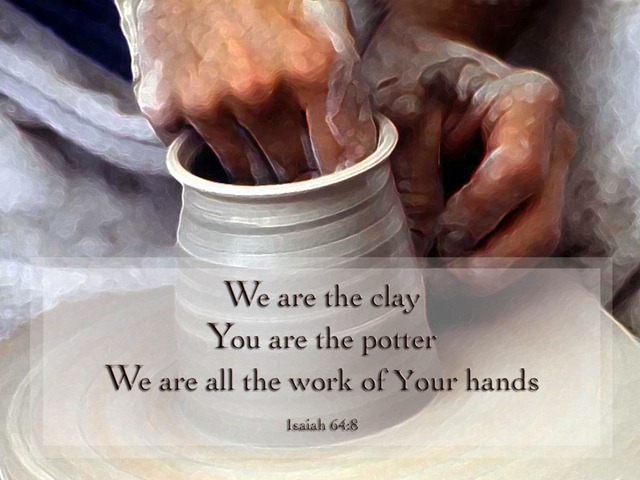There was a couple who took a trip to England to shop in a
beautiful antique store to celebrate their 25th wedding anniversary. They both
liked antiques and pottery, and especially teacups.
Spotting an exceptional cup, they asked "May we see that?
We've never seen a cup quite so beautiful."
As the lady handed it to them, suddenly the teacup spoke,
"You don't understand. I have not always been a teacup. There was a time
when I was just a lump of red clay. My master took me and rolled me, pounded
and patted me over and over and I yelled out, "Don't do that. I don't like
it! Let me alone," but he only smiled, and gently said, "Not yet."
Then WHAM! I was placed on a spinning wheel and suddenly I was
made to suit himself and then he put me in the oven. I never felt such heat. I
yelled and knocked and pounded at the door. "Help! Get me out of
here!" I could see him through the opening and I could read his lips as he
shook his head from side to side, "Not yet."
When I thought I couldn't bear it another minute, the door opened.
He carefully took me out and put me on the shelf, and I began to cool. Oh, that
felt so good! "Ah, this is much better," I thought.
But, after I cooled he picked me up and he brushed and painted me
all over. The fumes were horrible. I thought I would gag. "Oh, please,
stop it, stop, I cried." He only shook his head and said, "Not
yet."
Then suddenly he puts me back in to the oven. Only it was not like
the first one. This was twice as hot and I just knew I would suffocate. I
begged. I pleaded. I screamed. I cried. I was convinced I would never make it.
I was ready to give up. Just then the door opened and he took me out and again
placed me on the shelf, where I cooled and waited and waited, wondering,
"What's he going to do to me next?"
An hour later he handed me a mirror and said, "Look at
yourself." And I did. I said, "That's not me. That couldn't be me.
It's beautiful. I'm beautiful!"
Quietly he spoke: "I want you to remember. I know it hurt to
be rolled and pounded and patted, but had I just left you alone, you'd have
dried up. I know it made you dizzy to spin around on the wheel, but if I had
stopped, you would have crumbled. I know it hurt and it was hot and
disagreeable in the oven, but if I hadn't put you there, you would have
cracked. I know the fumes were bad when I brushed and painted you all over, but
if I hadn't done that, you never would have hardened. You would not have had
any color in your life. If I hadn't put you back in that second oven, you
wouldn't have survived for long because the hardness would not have held. Now
you are a finished product. Now you are what I had in mind when I first began
with you."

The moral of this story is this: God knows what He's doing for
each of us. He is the potter, and we are His clay. He will mold us and make us
and expose us to just enough pressures of just the right kinds that we may be
made into a flawless piece of work to fulfill His good, pleasing and perfect
will.
So when life seems hard, and you are being pounded and patted and
pushed almost beyond endurance; when your world seems to be spinning out of
control; when you feel like you are in a fiery furnace of trials; when life
seems to "stink", try this.
Brew a cup of your favorite tea in your prettiest tea cup, sit
down and think on this story and then, have a little talk with the Potter. -Anonymous


